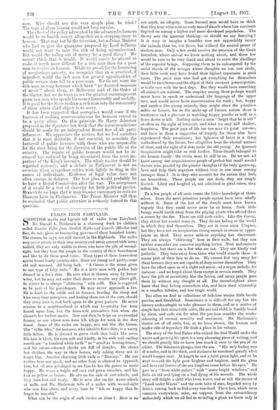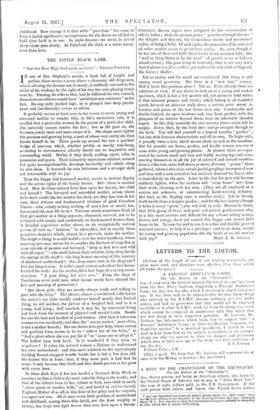EXILES FROM FAIRYLAND.
SCOTTISH myths and legends tell of exiles from Fairyland. Mr. Donald A. Mackenzie in a charming book for children called Wonder Toles from Scollisli Myths end Legends (Blackie and Son, Os. net) gives us fascinating pictures of these banished fairies. The stories, he says, are still current in the Highlands. The miles may never return to their own country and never consort with men ; indeed, they aro only visible to those who have the gift of second- eight, but they love the people in the country of their banishment and like to do them good turns. Many types of these benevolent spirits haunt lonely countrysides. Some are young and pretty, some old and wizened. All bring luck. "A Goons is the name given to one type of fairy exile." He is a little man with golden hair dressed in a fox's skin. He cats what is thrown away by house- wives, but he may not enter their doors or receive any direct gift. In winter he is always " chittering " with cold. This is supposed to be part of his punishment. He may never approach a fire. He is kind to the cattle and to farmers, heading the sheep and kine away from precipices, and leading them out of the corn, should they stray into it, and bark again to the grass pasture. He never returns to a neighbourhood in which any hospitality has been forced upon him, but the housewife remembers him when she discards her broken meats. Now and then he helps an overworked farmer, or one whose sons have left tillage for work in the doer forest. Some of the exiles are happy, not sad like the Goons. The " Gillis Dhu," for instance, who inhabits Ross-shire, is a merry little fellow. Ho is dressed in green cloth that looks like moss. His hair is block, his eyes soft and kindly, in his wide and smiling mouth are "a Imndred white teeth" as "small as hening-bones," and his cream-coloured checks are full of dimples. He shows lost children the way to their homes, only asking them not to forget him. Another charming little exile is " Dummy." He can neither hear nor speak, and no other fairy is allowed to approach him, but all men privileged to see him he has the power to make happy. He wstrs a bright red coat and green breeches, and has hair as yellow as broom. He sits on the axle of cart-wheels, and they turn fast and easily. He is seen also on the water-wheels of mills, and Mr. Mackenzie tells of a miller with second-sight who saw him often, and every time ho "felt so happy that he forgot he was old."
What can be the origin of such stories as these 1 Here is no sun myth, no allegory. Some learned men would have us think that they bear witness to an early race of dwarfs whose late survivors lingered on among a higher and mom developed population. The theory sets the ignorant thinking—or should we nay fancying ? It is easy to imagine a humbler moo not appreciably nearer the animals than we, not fierce, but without the mental power of modem man. Only a few could survive the presence of the Great Intruders, whose arrival wo know nothing about, and those few would be sure to be very timid and afraid to enter the dwellings of the superior beings. Supposing them to be unhampered by the awful rituals of the savages whose thoughts we can now study, their little souls may have found their highest expression in good turns. Tho great men who had got everything for themselves would be their heroes and the object of their constant preoccupation, as is the case with the best dogs. But they would have something all animals are without. The stupider among them perhaps would never learn to speak or understand the language of the upper race, and would never have concentration for work ; but, happy and careless like young animals, they might cheer the primitive miller or farmer, for in the make-up of human nature there is tenderness and a pleasure in watching happy pranks as well as a fierce desire to kill. Nothing makes a man " forget that he is old" so often as the sight of innocent, and what we may call shallow, happiness. The great joys of life are too near its great sorrows, and have in them a suggestion of tragedy for those who have experienced their transience ; but lightness of heart is a thing unshadowed by the future, free altogether from the eternal menace of time, and the sight of it does make the old young. An ignorant imagination might take us still further. Them dwarfs belonged to the human family—the strain must be still in us. Do we not all know among our acquaintances people of perfect but small mental stature who, puzzled by the greater thoughts of the truly grown-up, love and help their superiors without ever in one sense coming amongst them 1 It is they who account for the notion that fools are benevolent. These people are not fools, they are simply limited. Liked and laughed at, not admitted in great cries, they soften life.
To a few people of all sorts comes the bitter knowledge of them- selves. Even the most primitive people cannot have been wholly without it. Some of the last of the dwarfs must have known vaguely that they could never mere be at home. Such little beings would break away from the pitying giants who offered them a corner by the fire. There am still such exiles. Like the Goons, they shiver but cannot come in. They do not belong to the world in which they find themselves. They are in some sense Utopian, but they have not an imagination strong enough to create or appro- priate an ideal. They never achieve anything but discontent. They are always "chittering" here in their exile, but they can neither remember nor conceive anything better. Most malcontents are bitter, but them are a few who are not. They are kindly and pathetic. They turn away from those who would console them—it seems part of their fate to do so. We cannot feel very sorry for them because they are not capable of deep sorrow themselves They have the effect upon us of a slight sad music—of a negro melody, for instance—and we forget about them except in certain moods. They have the gift of invisibility like the fairies, and many people pass them by without any thought at all. The second-sighted alone know that they belong somewhere else, and have their citizenship in a smaller, inferior, and less tragic world.
Too often we find in collections of folk-lore stories little beside passion and bloodshed. Sometimes it is difficult for any but the literary archaeologist to take pleasure in them, and as a matter of simple fact that intractable critic, the natural child, is frankly bored by them, and calls out for what the precious consider the cruder colouring of current morality and sentiment. Mr. Mackenzie's stories are of all sorts, but, as we have shown, the human and tender side of legendary life finds a place in his volume.
The story of the Seal Fisher who visited the Seal World under tine waves and gave up his sport is a very charming piece of writing, sad we should greatly like to know how much it owes to the pen of its editor. The fisherman plunges into the sea. " His only feeling 'Wes of wonder, and in the thick, cool darkness he wondered greatly what would happen next. At length he saw a faint green light, and es ho went onward the light grew brighter and brighter, until the glens and bens and forests of the sea kingdom arose before his eyes." Ho goes to a " foam white palace " with " many bright windows," and finds an old seal lying on a bed dying of his wounds. The whole story will delight a child who loves water, and so will the stories of "Land under Waves" and the eerie tales of men, beguiled away by fairies, coming back to find every one dead. These last, which seem nonunion everywhere, arise, we suppose, from the extraordinary melancholy which NM all feel in revisiting a place we knew only in childhood. How strange it is that while " pass-time " has come to have a joyful significance, no expression for the desire we all feel to hold time back is in use. In night-dreams—we mean in actual sleep—time goes slowly. In Fairyland the clock is a worse enemy
even than here.



























 Previous page
Previous page